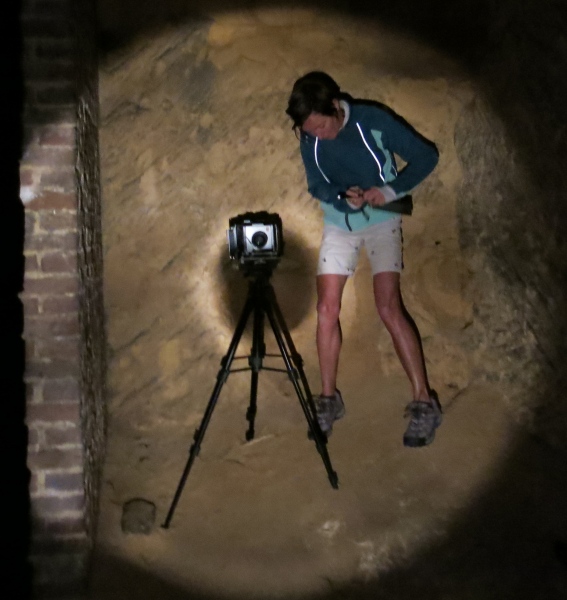-
.
Krien Clevis is beeldend kunstenaar-onderzoeker/curator, en werkt aan long term projecten in Rome en Nederland. Voor haar PhD (LOCVS, 2013) deed zij onderzoek naar de notie en kwaliteit van ‘plaats’– met name in de kracht van verandering – en zij confronteert dit artistiek onderzoek met onder andere archeologische debatten over plaats. Haar onderzoek combineert historische/archeologische, artistieke en persoonlijke exploraties van locaties met als doel om aan de opgediepte gelaagde betekenis van plaatsen, een nieuwe, artistieke betekenis toe te voegen. In het kader van haar Postdoc heeft Clevis het concept ‘OVERGANGSZONE’ ontwikkeld (2016-2021), een interdisciplinair onderzoeksproject waar kunstenaars samenwerken met stakeholders en betrokken partijen in het ENCI-gebied in Maastricht in transformatie (http://overgangszone.nl/). In Rome deed zij jarenlang onderzoek naar de standpunten van historische beeldmakers op Mijl V en VI van de Via Appia Antica. Dat resulteerde in het project REVISITED Via Appia (2022, Museum Het Valkhof, Nijmegen) in samenwerking met archeologen, 3D-dataspecialisten en -ontwikkelaars (https://revisited-via-appia.nl/). Recent werkte Clevis aan een foto research-project, waar zij het veranderingsproces van zes Leidse kerken en gemeenschappen volgde en in beeld en geluid vastlegde, hetgeen uitmondde in de tentoonstelling 'De Verkondiging' in de Petruskerk en twee interventies in Museum De Lakenhal te Leiden (1 november 2024 t/m 2 februari 2025). Onlangs toonde zij haar foto-research project STEYLER in het Missiehuis St. Michael te Steyl, over de missie van de congregatie Scietas Verbi Divini in transitie, dat zij in nauwe samenwerking met de congregatie uitvoerde (8 juni t/m 16 november 2025). Krien Clevis doceert Artistic Research, heeft de minor Artistic Research in Situ ontwikkeld en werkt voor het lectoraat What Art Knows van Zuyd University of Applied Science in Maastricht (ARiS: https://overgangszone.nl/artistic-research-in-situ/).
Krien Clevis is an artist-researcher and curator, having long term changes as a central theme in her work. She did so for projects in Rome and the Netherlands. In her PhD research (LOCVS, 2013), she investigated the notion and quality of ‘place’– especially in the power of transition – and has confronted this artistic research with archaeological debates about place. Her research combines historical, archaeological, artistic and personal exploration of locations, with the aim of adding new or alternative meaning to these layered places. After her PhD she developed the concept ‘TRANSITION ZONE’ (2016-2021) which is an interdisciplinary research project that focuses on artistic research in collaboration with various stakeholders (http://overgangszone.nl/). For this she focused at the ENCI-area – an old limestone quarry near to the city of Maastricht – that is not in use anymore and undergoes a transformation. In Rome, she focused at the Via Appia Antica where she looked to the viewpoints of historical image-makers at miles V and VI. This resulted in the project REVISITED Via Appia (2022, Museum Het Valkhof, Nijmegen) where she collaborated with archaeologists, 3D-data experts and software developers (https://revisited-via-appia.nl/). Recently she has worked on a photo-research-project '6 Leiden Churches in Transition', where she followed the change process of six churches in Leiden and captured them in image and sound. This completed in the exhibition 'The Annunciation' (De Verkondiging) in St. Peters church (Petrus kerk) and two interventions in Museum De Lakanhal, Leiden (01.11.2024 - 02.02.2025). Very recently, she presented her latest photo-research project in collaborartion with the congregation Sociatas Verbi Divini in Steyl - resulted in the exhibition STEYLER - which showed the live and work of the community in transition (08.06 - 16.11.2025). Krien Clevis is lecturer Artistic Research, has developed the minor Artistic Research in Situ and is member of the research group What Art Knows of Zuyd University of Applied Science in Maastricht (ARiS: https://overgangszone.nl/artistic-research-in-situ/).
